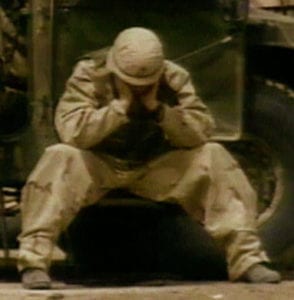God’s Work and PTS
When I returned home from my tour in Iraq, I was alert to loud noises, especially anything that sounded like an explosion. I sometimes had dreams of people being killed and my being unable to prevent their deaths. I didn’t like it when strangers would ring my doorbell—the sound of the bell and the knowledge that someone was unexpectedly outside my home would set off my adrenaline.
One night not long after I returned home, I saw a stranger walking across my front yard towards my house. I wasn’t expecting anyone that late at night. By the time I got to the front door I was ready for a fight—my adrenaline was pumping away. It was a delivery man at the wrong address.

Even church didn’t bring peace. My instincts saw too many people gathered in what appeared to be an unprotected shelter. I often felt out of place after service because I could tell that other people weren’t alert to rockets and mortars, otherwise they wouldn’t be as unconcerned as they carried on conversations in the parking lot. I wondered if there were other ways for me to worship God because church services were making me nervous.
How was God looking at me now that I was reacting combatively at home? Would I always jump when I heard a loud noise? What could I do to enjoy times of fellowship and worship with other believers?
If you’ve been in combat, you might relate to my experience. You might even find my feelings and actions to be minor compared to yours. But at whatever level you have endured post-traumatic stress disorder (PTSD), or have encountered it in a fellow warrior or loved one, you know the road to recovery is long and challenging. I want to encourage you to see that God is not absent as you face this challenge.
My ability to be highly alert and emotionally connected to the lives that were lost around me is, at its root, a gift from God. He created us with the ability to respond to danger and to feel the loss of those we love. PTSD is not about “going crazy.” It is better understood as a point where good abilities to respond to intense situations have simply reached an unhealthy limit. Because God designed and created each of us, He can comfort and heal us when we are pushed beyond what we can bear.
And since the truth—His Truth—sets us free (John 8:32), we need to understand what is true about PTSD, how it works, and how God can bring about our comfort and healing.
Medically—biologically—PTSD is about changes to our bodies because of combat. Our brains adjust to tiny bits of information that reveal danger (sounds, smells, and visual cues), and our bodies learn to pump adrenaline based on these bits of information. We also lock onto intense memories. As a result, we can re-experience feelings from combat and find ourselves extremely alert or on guard. These are biological changes occurring as God designed so that we can get through combat.

To deal with PTSD from a spiritual perspective, we need to understand the changes to our biology and make sense of combat events based on our faith. We experience our spiritual issues relating to PTSD in concrete ways that affect things like how we feel about the military once our combat tour is over, how we relate to a loved one who doesn’t understand what we have been through, how we understand our place in the world, and how we understand God’s love in light of the horrors of war.
Just as we are wired by God biologically, we are also spiritually wired to wrestle with these kinds of questions. Our spirit is made in God’s image, and it seeks to understand God’s work in us and His work in the world around us—in order to help us gain the mind of Christ (1 Corinthians 2:10-16). In difficult times, when we have encountered the hardest things that life can bring our way, we are invited by God himself to step into His kingdom and understand who He is and who we are in Him. We need to understand the changes to our biology and make sense of combat events based on our faith.
So how does God heal us? Biologically, the adrenaline and many of the memories fade over time as God takes our bodies back to a more relaxed state. We no longer need to be in a constant state of alertness. Sometimes, though, certain strong memories remain just below the surface. They may pop into our thoughts or appear in dreams. Overall, we feel better as time goes by, just as God designed us to. While things settle down and as we deal with some lingering memories, how does God help us find peace of mind?
We can follow Jesus, who took all that happened to Him and laid it as His Father’s feet. We know we can go before our Heavenly Father with our every need and receive His grace (Hebrews 4:15-16). Jesus taught us that God can bring forth something remarkable through the pain we experience, just as a woman going through the pain of childbirth receives her child with joy (John 16:21-24). In fact, we can find a way to rejoice in the midst of our troubles because Jesus has overcome the world (John 16:33). No, we don’t have all the answers. Our continuing pain can be perplexing. But when we suffer, we can be confident that God is with us and will help us endure and overcome (2 Corinthians 12:9-10).
I take my needs before God each day, resting in the fact He cares for me and that I am made in His image. When I react to a loud noise or my adrenaline starts pumping, I have a sense that—because of God’s steadfast love for my family and me—all is well. When I feel storm clouds gathering over me, I sense His peace. Whatever storms life may bring, He has overcome them all. God and I are bound by a love that is greater than all loves (John 15:9-17), and I have been blessed with God’s joy and peace that are greater than any secular thing (John 14:27).
Because this is God’s perspective for all of His children, this can be true for you as well, as He brings you comfort and healing.
Steps to Take Once Your Tour of Duty Is Over
- Deepen your relationship with Jesus. Nothing will help you more than building yourself through prayer and faith as you commune with your Savior. Jesus, who suffered as we suffer, nourishes us with His words and comforts us with His Spirit.
- Consult a Christian counselor. Seeking the wisdom of a clinically trained Christian counselor can (a) speed up the healing process and (b) give you a supportive place to go. Professional Christian counselors have been trained to understand how God made us biologically and spiritually. With Christian counselors, your faith will be honored and encouraged, even if you have deep doubts or questions.
- Find a few trusted people with whom you can share portions of your combat experience. Choose these people carefully, and tell them the stories you want them to hear. Tell your stories first without the graphic details, which can be overwhelming to nonprofessionals. As time goes on, you can share more. In the meantime, remember that you can share all your stories with God.
The content of this article comes from “The Warrior’s Bible” (2014) and is copyrighted by Life Publishers International. Used with permission.






